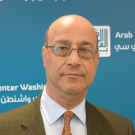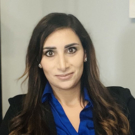Speakers

Ibrahim Al-Assil
Senior Fellow, Middle East Institute

Marsin Alshamary
Assistant Professor of Political Science, Boston College

Mai El-Sadany
Executive Director, Tahrir Institute for Middle East Policy
Moderator
About the Webinar
More than a decade after the Arab uprisings, countries across the Middle East and North Africa (MENA) region continue to grapple with political transitions, economic challenges, and social movements pushing for greater representation, democratization, and governance reform, with each country navigating its unique path. In Syria, the recent fall of Bashar al-Assad’s regime has led to a fragile transition, with tensions arising over the path towards forming an inclusive democratic government and transitional justice processes while dealing with the complexities of post-conflict reconstruction and economic development, authoritarian resilience, and the challenge of refugee return. Lebanon has emerged from a two-year political vacuum with a new president and prime minister, signaling a potential shift toward stability amidst ongoing economic and security challenges and demands for structural reform. Egypt reverted to an entrenched authoritarian regime as the government grapples with security and economic challenges while cracking down on political opposition and civil society space. Tunisia, once seen as the success story of the Arab Spring, is witnessing democratic backsliding under President Kais Saied, raising concerns about the erosion of freedoms and democratic norms. Iraq is striving to assert its sovereignty as it navigates a delicate balance between state-building, sectarian politics, and external influences.
Arab Center Washington DC (ACW) and the Center for Contemporary Arab Studies (CCAS) at Georgetown University are organizing a webinar to examine the challenges and prospects of inclusive governance and democratic transitions in Syria, Lebanon, Egypt, and Iraq. This panel discussion will explore the evolving landscape of governance in the region, highlighting both the obstacles and opportunities for building inclusive and democratic systems. Panelists will examine the barriers to political inclusion and democratic governance, the role of external actors in shaping governance trajectories, the potential for reform in authoritarian or hybrid regimes, the impact of political economy and state-society relations on governance structures, the role of youth movements and civil society organizations in pushing for political change, the impact of sectarian divisions and power-sharing agreements on maintaining or obstructing governance reform, and what constructive roles the United States and international actors can play to support transparent economic development and recovery efforts and promote democratic reforms and inclusive governance.
the challenges and prospects of inclusive governance and democratic transitions in Syria, Lebanon, Egypt, and Iraq. This panel discussion will explore the evolving landscape of governance in the region, highlighting both the obstacles and opportunities for building inclusive and democratic systems. Panelists will examine the barriers to political inclusion and democratic governance, the role of external actors in shaping governance trajectories, the potential for reform in authoritarian or hybrid regimes, the impact of political economy and state-society relations on governance structures, the role of youth movements and civil society organizations in pushing for political change, the impact of sectarian divisions and power-sharing agreements on maintaining or obstructing governance reform, and what constructive roles the United States and international actors can play to support transparent economic development and recovery efforts and promote democratic reforms and inclusive governance.
Featured image credit: Shutterstock/Ayman Zaid


